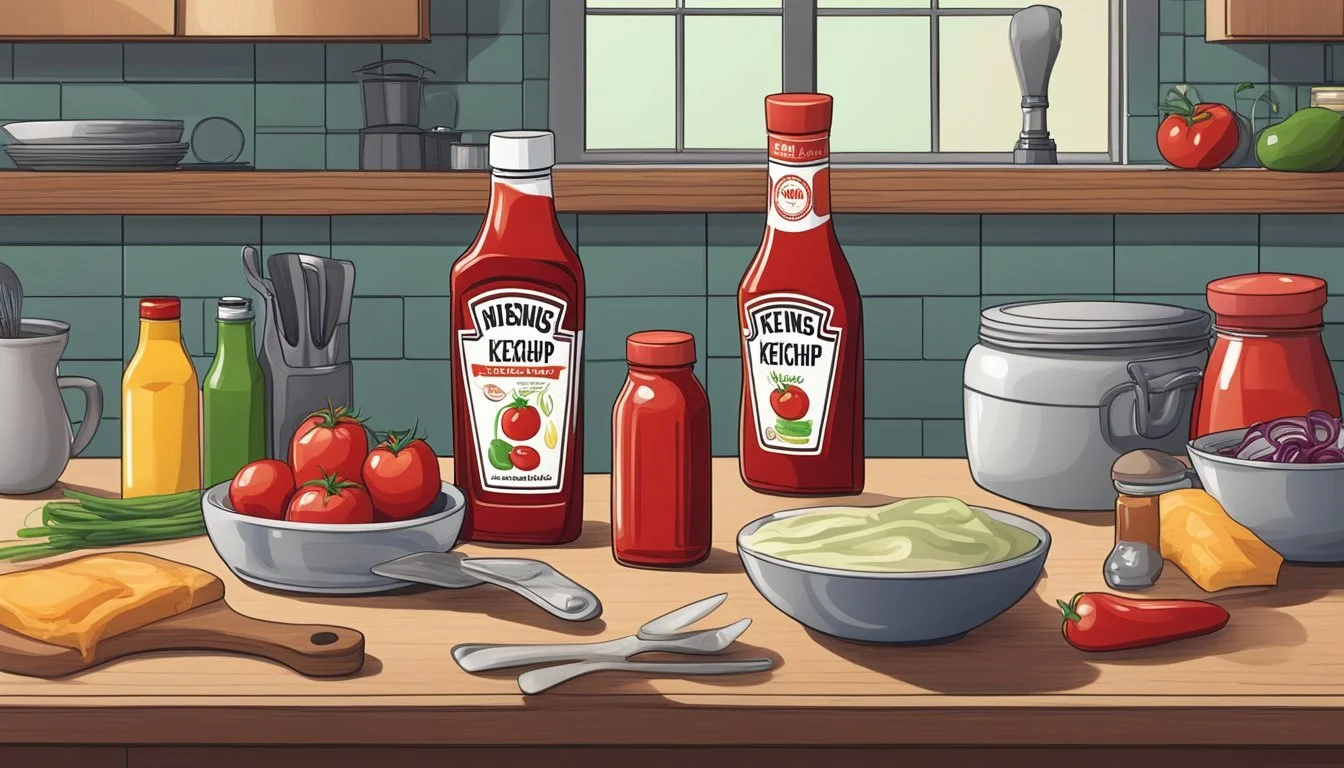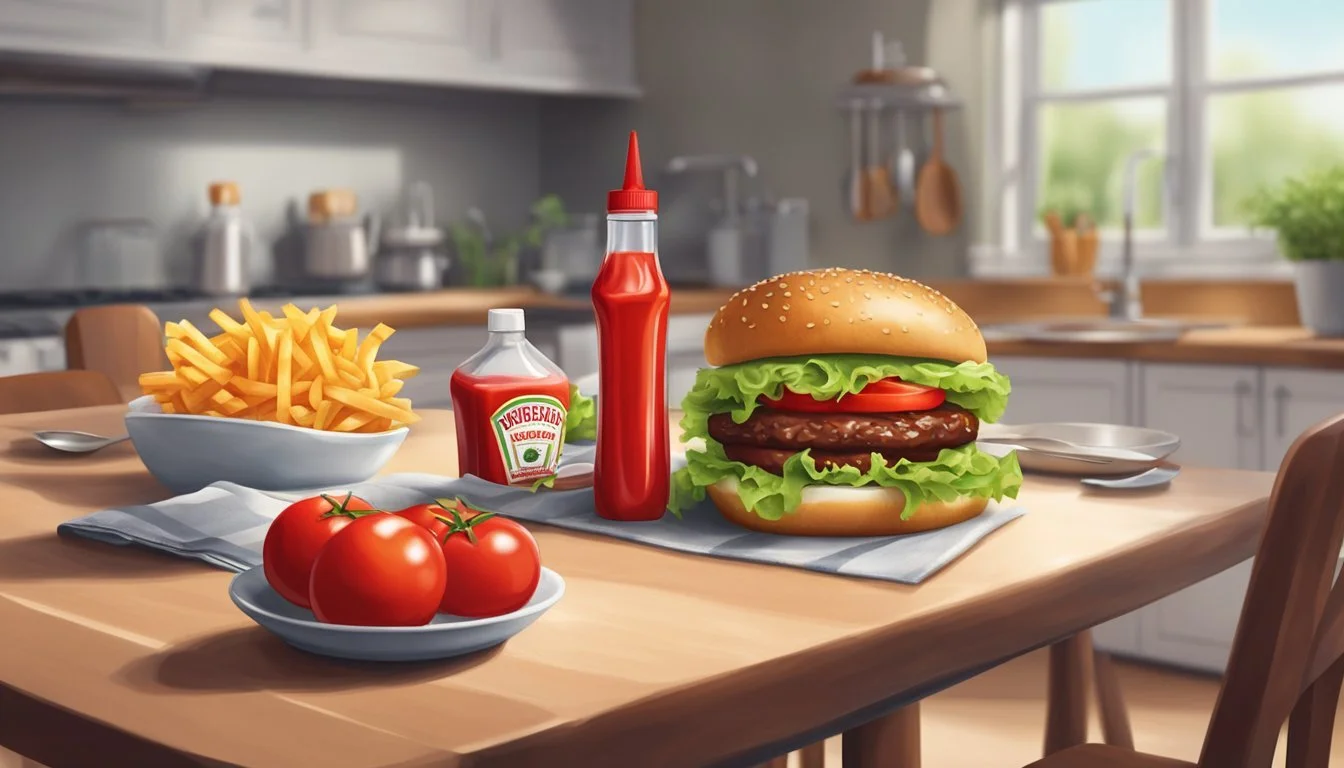Does Ketchup Go Bad?
Shelf Life and Storage Tips
Ketchup is a staple condiment found in many kitchens worldwide, known for its sweet and tangy flavor that complements a variety of dishes. While it does contain vinegar and other preservatives that extend its shelf life, it's not impervious to spoilage. Over time, even this ubiquitous condiment can degrade in quality due to factors like storage conditions and the passage of time. It is essential to know how to identify when ketchup has gone bad to ensure both food safety and culinary quality.
There are a few clear indicators that can help determine if ketchup is no longer at its best. Visual changes, such as separation, where the liquid separates from the solid part of the sauce, can be a clue. Additionally, any developments of an unusual color or the presence of mold are strong signs that ketchup should no longer be consumed. Beyond appearance, any off or sour smells, or a noticeable divergence in taste from its distinctively rich umami flavor, suggest that the ketchup has spoiled and should be discarded.
Consumers should pay attention to the expiration or "best by" dates provided by the manufacturer, but these dates are often indicators of quality rather than safety. Although ketchup past its date may still be safe to consume if it appears and smells normal, it is incumbent upon individuals to inspect their ketchup for spoilage signs. Safety and enjoyment of this popular condiment hinge on remaining vigilant about its condition.
Understanding Ketchup
Recognizing the components and diversity in types of ketchup is fundamental to appreciating its shelf life and potential for spoilage.
Composition and Ingredients
Ketchup is a ubiquitous condiment typically known for its sweet and tangy flavor profile. Central to its composition are tomatoes, which provide the base flavor and texture. Vinegar is then introduced to the mixture, imparting a distinctive tanginess and serving as a natural preservative due to its acidity. To enhance the taste, added sugar and onions contribute to the depth of flavor.
Amongst other ingredients, preservatives may be incorporated to extend the shelf life, though some brands like Heinz aim to use the natural preservatives found within vinegar and tomatoes. Here is a breakdown of common ingredients found in regular ketchup:
Tomatoes
Vinegar
Sugar
Onions
Flavorings and spices
Salt
Preservatives (e.g., sodium benzoate)
This formula is subject to adjustments in homemade ketchup, where the maker can tailor to personal preference, often reducing the sugar content and foregoing artificial preservatives.
Types of Ketchup
Ketchup comes in a variety of types, each with its unique adjustments to the traditional recipe. Regular ketchup is what most consumers are familiar with, a sweet and tangy sauce with a smooth consistency, commonly used in fast food and households worldwide. Heinz, as a leading brand, sets a standard for this category.
Homemade ketchup offers an artisanal alternative, often highlighting organic ingredients and lacking preservatives, which changes its storage qualities and taste. Commercially, one may also find ketchup varieties catering to specific dietary needs such as reduced sugar or salt, and organic ketchup that abstains from using any artificial preservatives and flavorings.
Shelf Life and Storage
Ketchup's longevity is influenced by its storage conditions and state (unopened, opened, or homemade). Proper storage can significantly extend ketchup’s edible period, ensuring both safety and taste.
Unopened Ketchup
Unopened bottles of ketchup are shelf-stable and generally retain quality for 1-2 years past the printed best by date when stored in a cool, dry pantry. The best by date is an indication of quality rather than safety; thus, unopened ketchup can be used beyond this date if it shows no signs of spoilage.
Opened Ketchup
Once opened, ketchup should be stored in the refrigerator to maintain optimal taste and safety. In the fridge, opened ketchup typically has a shelf life of 6-12 months. At room temperature, an opened bottle's contents might degrade much more quickly, often within one month.
Homemade Ketchup
Homemade ketchup, lacking the preservatives found in commercial brands, should always be refrigerated and has a shorter shelf life of about 2-3 months. Ingredients and preparation methods affect homemade ketchup’s longevity, emphasizing the need for careful storage.
Freezing and Thawing
Freezing ketchup is possible, albeit not common practice. If one chooses to freeze ketchup, it’s advisable to use ice cube trays for easier thawing. To thaw, transfer the needed amount of ketchup cubes to the fridge. Note that freezing may alter the texture or taste due to separation of ingredients.
Identifying Spoilage
Ketchup can indeed spoil, and it is imperative for consumers to recognize the signs of spoilage to ensure their condiment remains safe for consumption. Spoiled ketchup can manifest through various sensory changes, visual indicators, or be past its expiration date.
Sensory Changes
Spoiled ketchup may exhibit a distinct change in taste and smell. If the condiment has a sour or off smell, or its taste differs significantly from its familiar tangy sweetness, it's a clear indicator that the ketchup is no longer good to eat. Trusting one's senses is an important step in determining ketchup's usability.
Visual Signs
Visual cues are also essential when assessing ketchup's condition:
Color: Look for any color change; ketchup that has darkened to a maroon color may indicate spoilage.
Mold: If there is any visible mold growth on the ketchup, it must be discarded.
Separation: While some separation is normal, excessive watery texture signifies that the ketchup's consistency has been compromised.
Expiration Date Relevance
The best-by date or expiration date on ketchup bottles provides a guideline for its anticipated shelf life. While ketchup can remain good past this date, especially if unopened, the presence of any previously mentioned signs should override the date printed on the packaging. Expired ketchup should be examined critically for spoilage before use.
Best Practices for Ketchup Use
When it comes to ketchup, a popular condiment, adhering to proper storage and handling methods ensures both food safety and the preservation of its intended flavor.
Proper Ketchup Storage
Temperature: Ketchup should be stored in a cool, dry place away from direct sunlight. Once opened, it's best to refrigerate the bottle to extend its shelf life.
Unopened: A pantry or cupboard away from heat sources is ideal.
Opened: Refrigeration is recommended; it can last 6 to 12 months this way.
Orientation: Store the bottle upside down to maintain ease of use and preserve the ketchup's quality. This prevents oxygen from entering the bottle and causing oxidation, where the ketchup could develop a metallic taste or alter in texture.
Preventing Contamination
Utensils: Always use a clean utensil to remove ketchup from the bottle to avoid introducing bacteria or other contaminants.
Bottle Cap: Keeping the cap clean is crucial. Wipe it periodically to prevent accumulation of dried ketchup, which can attract bacteria and potentially lead to contamination.
Ketchup in Different Contexts
Ketchup's longevity and quality vary by packaging and storage methods. Its texture and flavor are influenced by oxidation and exposure to sunlight, which are significant considerations across different contexts.
Ketchup Packets
Ketchup packets ensure a longer shelf life compared to bottled ketchup due to their sealed and single-use nature. They resist oxidation and contamination because each packet is only opened at the time of use. Ketchup packets do not require refrigeration, making them convenient for on-the-go consumption.
Texture & Quality: Packets maintain ketchup’s texture, preventing it from becoming watery.
Food Storage: Ideal for one-time use, eliminating long-term storage issues.
Comparing with Other Condiments
When comparing ketchup to other condiments such as mustard, one can note differences in longevity and reaction to storage conditions. Mustard typically has a longer shelf life and is more stable when exposed to sunlight or fluctuating temperatures.
Ketchup vs Mustard:
Longevity: Ketchup tends to degrade faster.
Oxidation: Ketchup can develop a metallic flavor when oxidized, more so than mustard.
Pairing with Foods
Ketchup is most commonly paired with foods like french fries. How ketchup is stored can affect its quality when served with such foods.
Texture: French fries require a ketchup that is neither too runny nor too thick.
Quality: Fresh, properly-stored ketchup enhances the overall taste experience, while degraded ketchup due to poor storage could detract from it.
By considering these factors, consumers can ensure the optimal use and enjoyment of ketchup across various settings.




